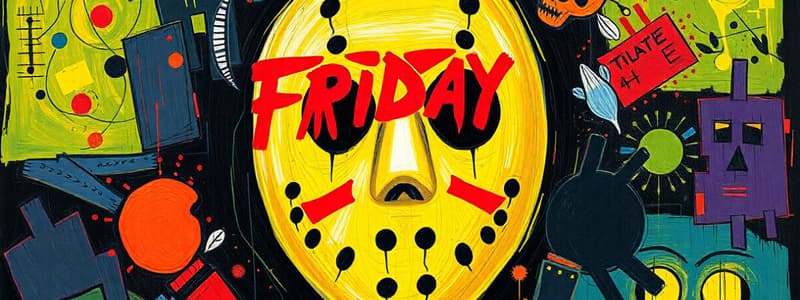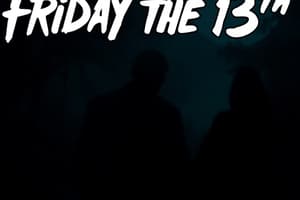Podcast
Questions and Answers
What is the term used to describe the fear of the number 13?
What is the term used to describe the fear of the number 13?
- Dodekaphobia
- Unidekaphobia
- Triskaidekaphobia (correct)
- Tetraphobia
Which historical event is NOT associated with Friday the 13th according to the superstitions outlined?
Which historical event is NOT associated with Friday the 13th according to the superstitions outlined?
- Eve tempting Adam
- The Last Supper (correct)
- Cain killing Abel
- Jesus' crucifixion
According to folklore, which god was convinced by Loki to kill Balder during the dinner of the 12 gods?
According to folklore, which god was convinced by Loki to kill Balder during the dinner of the 12 gods?
- Loki himself
- Thor
- Odin
- Hoder (correct)
What is the estimated economic impact of Friday the 13th on businesses in the US?
What is the estimated economic impact of Friday the 13th on businesses in the US?
Which biblical figure is believed to have been involved in the original sin, potentially linking Friday with misfortune?
Which biblical figure is believed to have been involved in the original sin, potentially linking Friday with misfortune?
What impact does the superstition of Friday the 13th have on people in high-risk jobs?
What impact does the superstition of Friday the 13th have on people in high-risk jobs?
Which of the following best describes the psychological effect of Friday the 13th on millions of people?
Which of the following best describes the psychological effect of Friday the 13th on millions of people?
What conclusion did a 2008 study draw about accidents on Friday the 13th compared to other Fridays?
What conclusion did a 2008 study draw about accidents on Friday the 13th compared to other Fridays?
What is the primary cultural difference in the perception of the number 13?
What is the primary cultural difference in the perception of the number 13?
In what way did the number 12 influence perceptions of the number 13 historically?
In what way did the number 12 influence perceptions of the number 13 historically?
What event from Christianity is likely linked to the superstition surrounding the number 13?
What event from Christianity is likely linked to the superstition surrounding the number 13?
How did ancient Sumerian culture influence modern systems of counting and time?
How did ancient Sumerian culture influence modern systems of counting and time?
Why do superstitions, such as those surrounding the number 13, persist in modern society?
Why do superstitions, such as those surrounding the number 13, persist in modern society?
What was the main purpose of establishing the '13 Club' in 1881?
What was the main purpose of establishing the '13 Club' in 1881?
Which aspect of Friday has been traditionally linked to bad luck?
Which aspect of Friday has been traditionally linked to bad luck?
How does numerology view the number 13 compared to the number 12?
How does numerology view the number 13 compared to the number 12?
What potentially contributed to Friday's demonized reputation according to the content?
What potentially contributed to Friday's demonized reputation according to the content?
Which of the following statements correctly reflects the roots of the superstition of Friday the 13th?
Which of the following statements correctly reflects the roots of the superstition of Friday the 13th?
Flashcards
Triskaidekaphobia
Triskaidekaphobia
The fear of the number 13.
Friday the 13th Superstition
Friday the 13th Superstition
A superstition that claims Friday the 13th is an unlucky day.
13's Unluckiness
13's Unluckiness
The idea that 13 is an incomplete or unlucky number due to its association with 'complete' numbers like 12.
Norse God Legend
Norse God Legend
Signup and view all the flashcards
Friday's Negative Association
Friday's Negative Association
Signup and view all the flashcards
Friday the 13th and Accidents
Friday the 13th and Accidents
Signup and view all the flashcards
Friday the 13th's Economic Impact
Friday the 13th's Economic Impact
Signup and view all the flashcards
Friday the 13th and Statistics
Friday the 13th and Statistics
Signup and view all the flashcards
Why was 12 considered a perfect number?
Why was 12 considered a perfect number?
Signup and view all the flashcards
What biblical event is connected to the superstition of 13?
What biblical event is connected to the superstition of 13?
Signup and view all the flashcards
Is the fear of 13 universal?
Is the fear of 13 universal?
Signup and view all the flashcards
What does the varying perception of 13 across cultures suggest?
What does the varying perception of 13 across cultures suggest?
Signup and view all the flashcards
Why might superstitions persist despite advancements?
Why might superstitions persist despite advancements?
Signup and view all the flashcards
Friday the 13th: Ancient Origins
Friday the 13th: Ancient Origins
Signup and view all the flashcards
Friday's Bad Luck: Norse Goddess
Friday's Bad Luck: Norse Goddess
Signup and view all the flashcards
Friday's Bad Luck: Christianity
Friday's Bad Luck: Christianity
Signup and view all the flashcards
The Friday the 13th Superstition
The Friday the 13th Superstition
Signup and view all the flashcards
Study Notes
Friday the 13th Superstition
- Millions globally believe Friday the 13th is the unluckiest day, despite uncertain origins.
- Triskaidekaphobia (fear of the number 13) contributes to this belief.
- Some associate the number 13 with incompleteness, following the perceived completeness of 12.
- The superstition dates back to at least the mid-19th century.
- William Fowler, a US Army Captain, founded the "13 Club" in 1881 to challenge this belief.
- The 13 Club, consisting of 133 New Yorkers, met on Friday, October 13, 1881, performing superstitious acts like walking under ladders and breaking mirrors.
- Norse mythology links the number 13 to misfortune.
- Numerologically, 12 signifies wholeness; 13 disrupts this completeness.
- Alternative explanations link Friday's negative connotations to the Norse goddess Frigg (Freya), associated with beauty, wisdom, love, war, magic, and death.
- Fridays were considered unlucky for weddings in some cultures.
- Friday also held negative connotations in Christian contexts, potentially contributing to its association with bad luck. The combined negative connotations of both the number and the day intensify the superstition of Friday the 13th.
Economic Impact
- Friday the 13th affects the US economy with estimated annual losses around $900 million.
- This loss stems from decreased consumer activity due to superstition.
- Statistically, fewer accidents, fires, and thefts occur on Friday the 13th than other Fridays (2008 study).
Fear and Superstition
- 20 million Americans experience anxiety on Friday the 13th, and many more globally.
- This fear, especially in high-risk occupations, sometimes leads to accidents.
- Businesses sometimes offer discounts to counteract fear and encourage purchases on this day, despite the perception of bad luck.
- Superstitions arose during uncertain times, offering a sense of control.
- Despite changes, superstitions remain present today.
- Ancient Egyptians considered 13 lucky, while the Chinese considered 4 unlucky, highlighting cultural variations in beliefs.
Studying That Suits You
Use AI to generate personalized quizzes and flashcards to suit your learning preferences.
Description
Explore the intriguing superstitions surrounding Friday the 13th, including its origins and the psychology behind triskaidekaphobia. Discover its economic impact in the U.S. and the relations between fear, superstition, and statistical occurrences. A fascinating dive into a day filled with belief and consequence.





